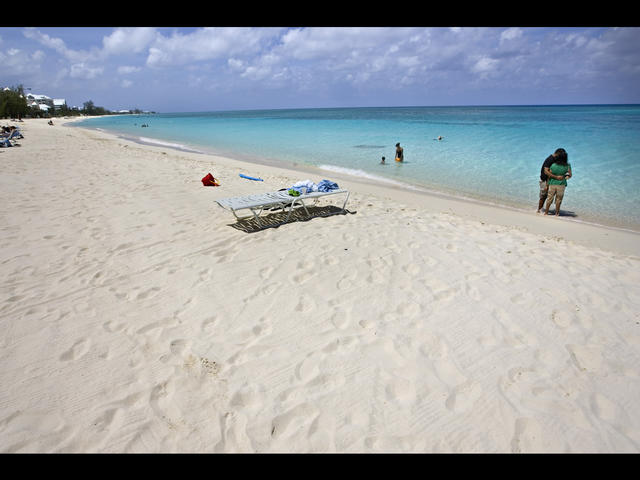WASHINGTON – Bermuda and the Cayman Islands are the top tax havens for American corporations to legally reduce their federal tax liability, a study by U.S. PIRG and Citizens for Tax Justice concludes.
More than 64 percent of Fortune 500 companies had a subsidiary in Bermuda or the Cayman Islands as of 2013, the examination of company annual reports and securities filings showed.
Both countries have no corporate income taxes in contrast to the 35 percent corporate tax rate in the United States.
The two liberal groups released the report at a time when Congress and the Obama administration are considering an overhaul of the corporate tax code.
Fortune 500 companies collectively hold $1.95 trillion in foreign accounts, according to the report by U.S. PIRG and Citizens for Tax Justice.
"We're looking at tax havens seriously and closing loopholes,'' Democratic Sen. Chuck Schumer said in an interview. I don't know anything about this report, but there are a lot of loopholes that ought to be closed.''
There is widespread bipartisan congressional support for enacting a lower corporate tax rate with fewer loopholes. Cracking down on the legal tax avoidance by multinational corporations that can book profits overseas at a much lower effective tax rate could be a key component of a tax overhaul.
The awareness has been heightened by Pfizer's recent unsuccessful efforts to buy British-based AstraZeneca to lower its taxes in a so-called tax inversion that would move its headquarters overseas.
The authors of the new report weren't able to determine how much profits the Fortune 500 booked specifically in Bermuda and the Caymans, but they cite Internal Revenue Service data that suggests U.S. companies are using subsidiaries located there to legally avoid taxes.
According to the IRS data, U.S. companies – not just the Fortune 500 -- collectively booked profits in Bermuda and the Caymans in 2010 that were more than 16 times the gross national product of the two countries combined.
That signals the earnings are actually earned elsewhere, said Dan Smith of U.S. PIRG, one of the authors of the report.
The problem is not new. A 2008 report by the nonpartisan Congressional Research Service found American multinationals attributed 43 percent of their overseas earnings to five tax havens – Bermuda, Ireland, Luxembourg, the Netherlands and Switzerland.
The U.S. government doesn't require disclosure of where profits are earned versus where they are booked.
"We should be able to know on a country-by-country basis where they are reporting their profits, where they are doing actual business and where they are paying taxes,'' Smith said.
Apple, which has three subsidiaries in tax havens, has $111.3 billion offshore. IBM, with 15 subsidiaries in tax havens, has $52.3 billion in foreign accounts. Citigroup, with 21 tax haven subsidiaries, holds $43.8 billion overseas, and PepsiCo, with 137 tax haven subsidiaries, has $34.1 billion offshore.
"Citi operates in 101 countries globally, employing tens of thousands of local residents in the countries where we do business,'' Citigroup spokeswoman Molly Millerwise Meiners said Friday in an email. "Citi strictly abides by all tax laws in the United States and throughout the world."
Similarly, IBM spokesman Doug Shelton responded: "IBM is no different than any other US multinational. We have substantial operations in the U.S. and abroad. We continue to believe that the U.S. tax code needs reform, to improve the global competitiveness of U.S. companies.''
Last year Apple received the scrutiny of a Senate oversight panel for shifting its intellectual property rights overseas as part of a strategy that legally avoided paying U.S. taxes on more than $74 billion in sales between 2009 and 2012.
"We pay all the taxes we owe, every single dollar,'' Apple CEO Tim Cook testified.
Only 55 of the Fortune 500 companies – including Citigroup -- disclosed what they would have paid in additional U.S. taxes if some of their profits were not booked overseas. The report found those companies would have paid an additional $147.5 billion to the federal government.
Two states – Montana and Oregon – have enacted laws that impose state taxes on all corporate earnings by U.S. companies in certain countries they list as tax havens. Under that law, Montana collected an additional $7.2 million in corporate taxes in 2010.
U.S. PIRG estimates the State of New York would boost its tax revenue by $141.6 million under a similar law.
Montana considers about 40 countries tax havens. A 2008 report by the U.S. Government Accountability Office, which listed 50 countries as tax havens, also found 83 of the largest publicly traded companies in the U.S. reported revenue from subsidiaries in tax havens in 2007.
U.S. PIRG and Citizens for Tax Justice used the same list developed by the GAO for its findings.


